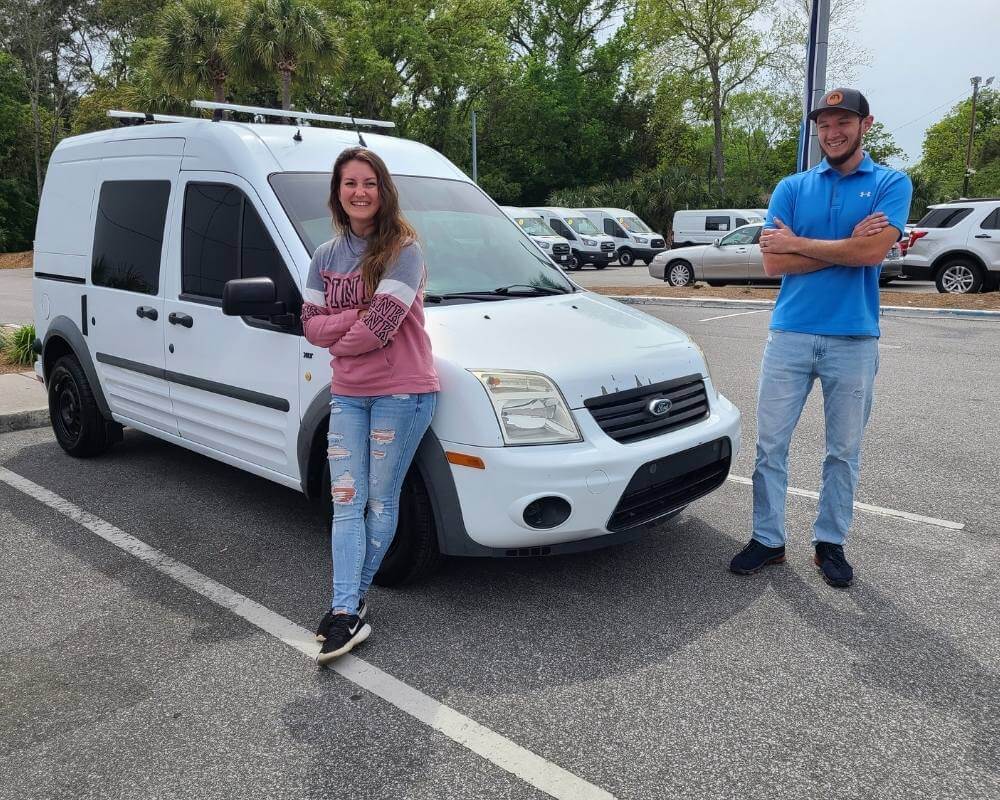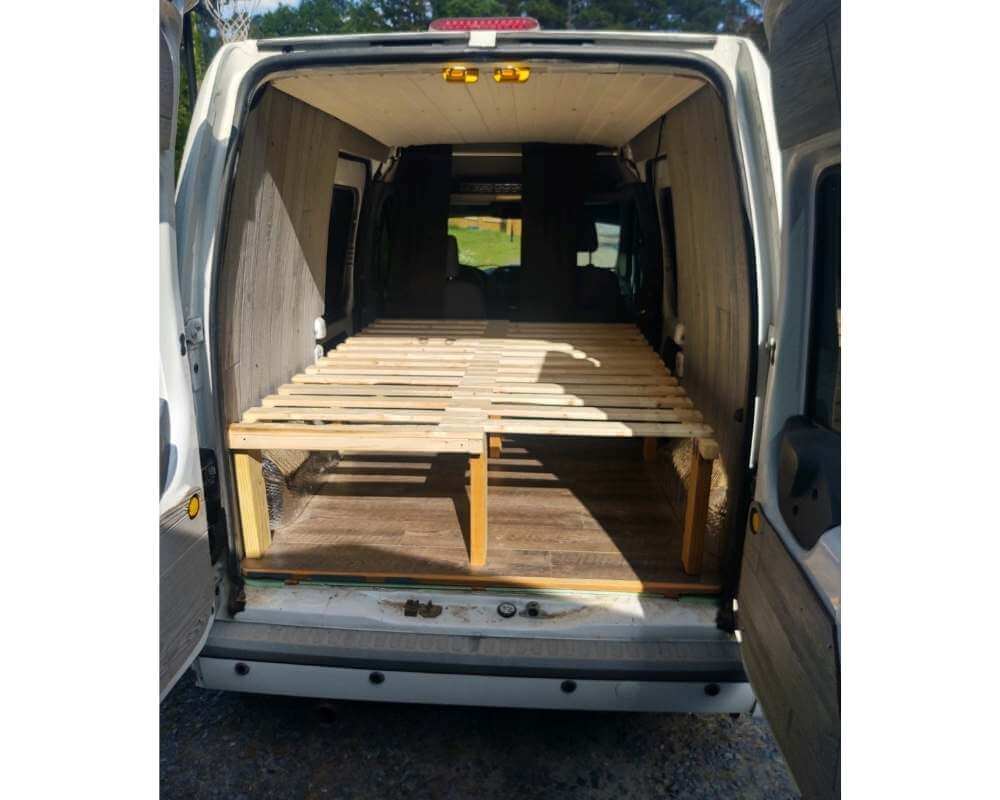Last Updated on April 30, 2024 by Nikole
The excitement of winter wanderlust fills the air, and you yearn to venture into the cold embrace of nature’s icy beauty. Your camper van adventures don’t have to stop when it gets cold- you just need a few tips to help you through the winter.
This post may contain affiliate links, which means I’ll receive a commission if you purchase through my links, at no extra cost to you. Please read full disclosure for more information.
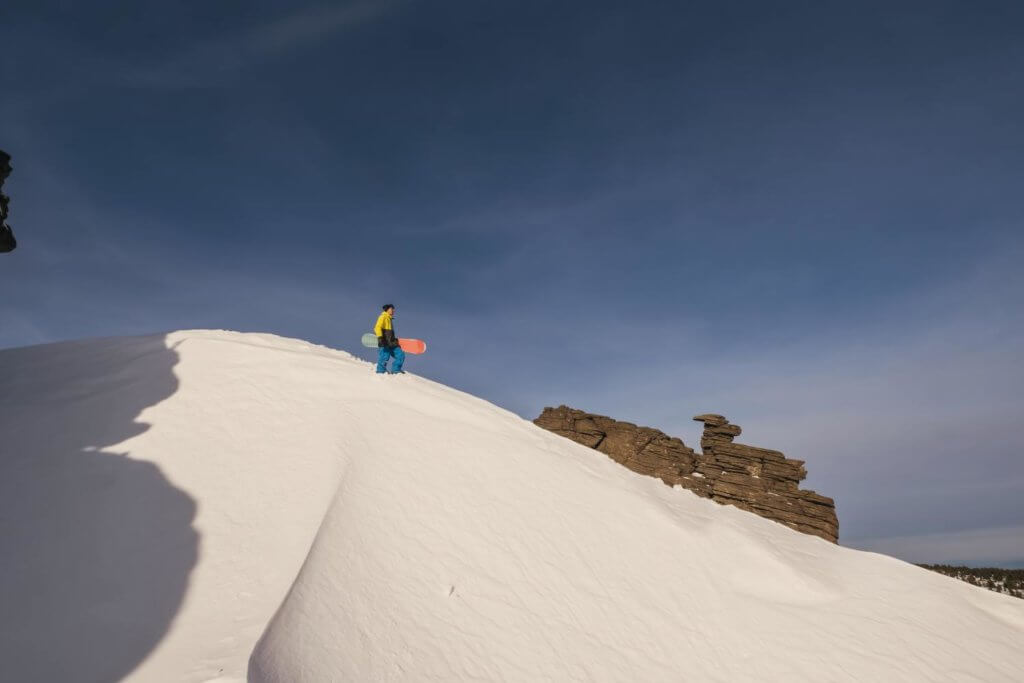
In this article, we will delve into the magic of camper van travel during the winter months, exploring everything from:
- The importance of insulating
- Staying warm in frigid temperatures
- Preparing for less daylight
- Deciphering weather conditions.
So, bundle up, grab a warm drink, and join us on a journey to unlock the secrets of winter wanderlust with camper vans.
Surviving the Cold: Essential Hacks for Winter Camper Van Life
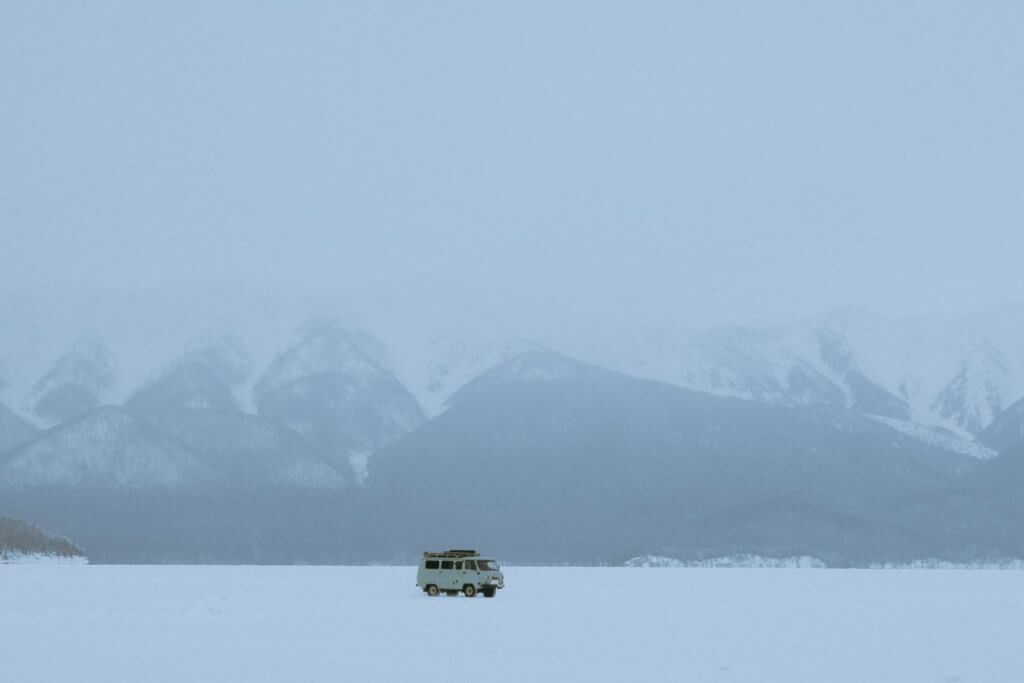
When embarking on a winter camper van adventure, being prepared for the ever-changing weather conditions is an absolute must.
Staying in tune with the weather forecasts and remaining flexible in your plans will ensure you are ready to adapt and tackle any unexpected challenges that may arise.
Pack essential winter items such as snow chains, emergency supplies, and extra fuel to guarantee you are equipped to handle whatever nature throws your way.
Vanlife Winter Tip #1: Insulate Big Time
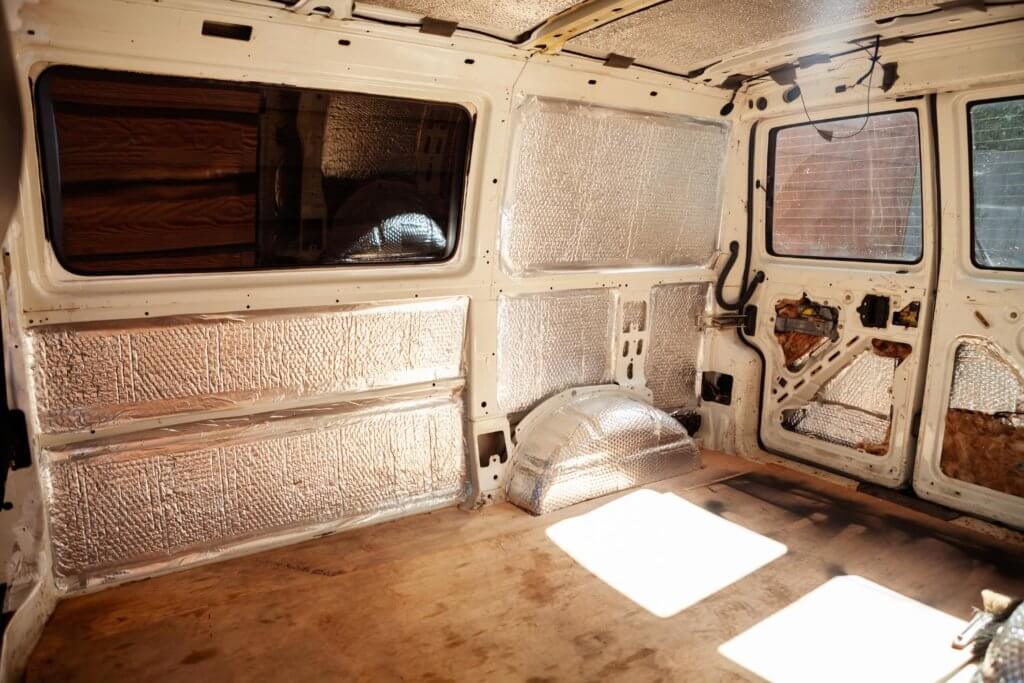
One of my most important tips for winter van life is to focus on insulating your camper van. If you take any key point away from this post let it be insulation, because it’s the best way to combat cold weather in your camper van!
Without proper insulation, it can be challenging to maintain a comfortable temperature inside your van during the colder months, especially if you are camping in below-zero-degree weather.
Insulation also helps with moisture issues in your camper van, and these issues are more likely in the fall and winter months.
You want insulation in all of these areas of your camper van to maintain a warm environment:
- Behind the walls
- Ceilings
- Floors
- Windows
- Wheel wells
- Front cab area
There are various insulation options available. Whichever material you choose, make sure to cut it to fit snugly into the spaces between the wall studs. This will prevent cold air from seeping in and keep the warmth where it belongs.
Another area where heat tends to escape, and some forget to insulate (we were almost one of those people), is through the floors. Cold floors can make a significant impact on your comfort, especially when your feet hit ice-cold wood floors in the mornings.
To combat this, consider installing a layer of insulation beneath the flooring and installing insulated flooring materials. Reflective foil insulation or foam mats can work wonders in preventing heat loss through the floor. Rugs can also provide comfort for your freezing toes.
Vanlife Winter Tip #2: Cover Your Windows
Don’t forget about the windows – they are notorious for letting cold air infiltrate your van. Reflective window covers or thermal curtains can help trap heat inside and prevent drafts.
If you’re feeling crafty, you can also create your window coverings using insulating materials like bubble wrap or reflective foil. We used bubble wrap on our windows and it actually worked wonders.
Vanlife Winter Tip #3: Wear Warm Clothes
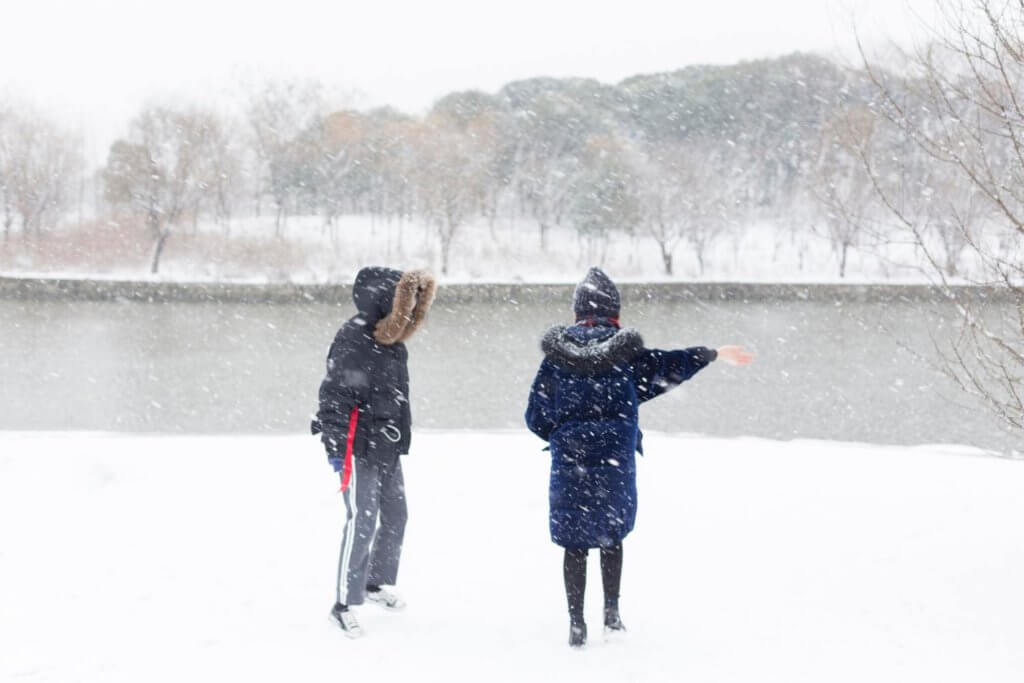
Staying warm in cold seasons requires a multi-layered approach, and that includes dressing appropriately. So, make sure to wear warm clothes, such as wool products, that will keep you insulated and comfortable throughout your adventures.
Layering is key to maintaining warmth, so start with a moisture-wicking base layer that will keep you dry and prevent sweat from chilling your body. Look for thermal tops and bottoms made from materials like merino wool or synthetic fibers, as they offer excellent insulation properties.
For your mid-layer, choose items that provide additional warmth without adding bulk. Fleece jackets or down vests are ideal options, as they can be easily removed or added depending on the temperature.
When it comes to your outer layer, a waterproof and windproof jacket is essential. Look for one with insulation built-in or wear a separate insulated layer underneath.
Accessories such as gloves, hats, and scarves are also crucial for retaining body heat. Look for items that are made from insulating materials like fleece, wool, or synthetic fibers.
We go over clothing in more detail in our essential camper van winter gear post.
Vanlife Winter Tip #4: Heater Friends for Winter Vanlife
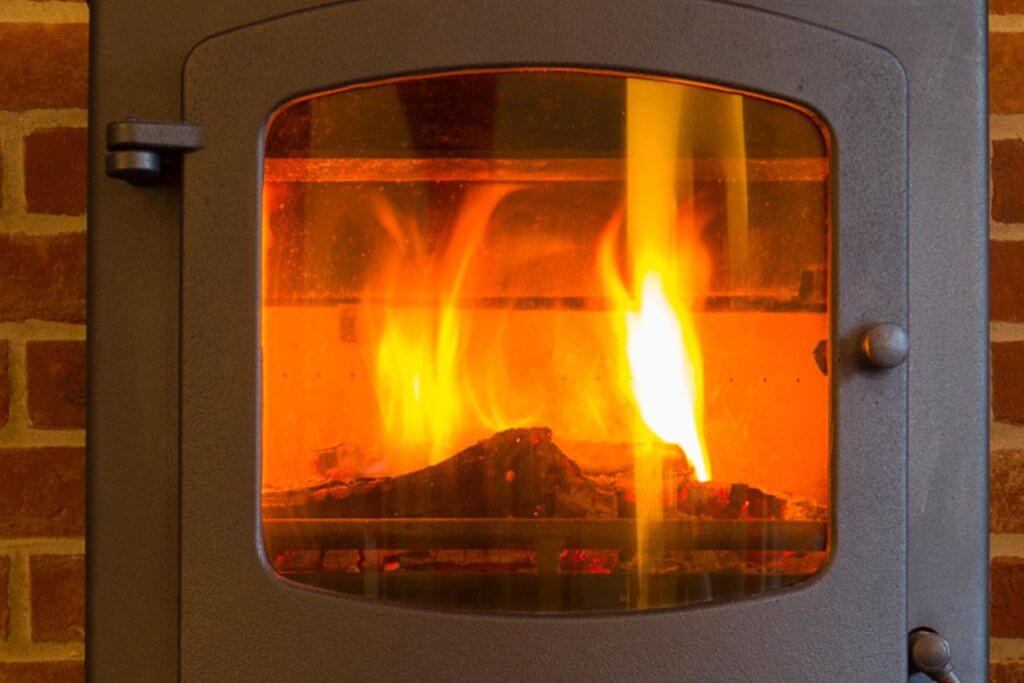
Another huge hack or I should say necessity, for winter van life travel is, having a heating system installed. We recommend using a wood stove or propane furnace so you won’t need to worry about electricity.
A reliable heater not only provides warmth but also helps to combat condensation and humidity inside the vehicle. If you use a heater, make sure you have insulation so you won’t waste your fuel trying to heat your van.
In addition to heating systems, there are other heater friends you can rely on to enhance your winter van life experience. Electric blankets are a popular choice for keeping warm while sleeping or lounging inside your van.
Additionally, heated seat cushions or blankets can be a lifesaver during long drives, keeping you warm and comfortable during your winter journeys.
Vanlife Winter Tip #5: Prepare for Less Daylight
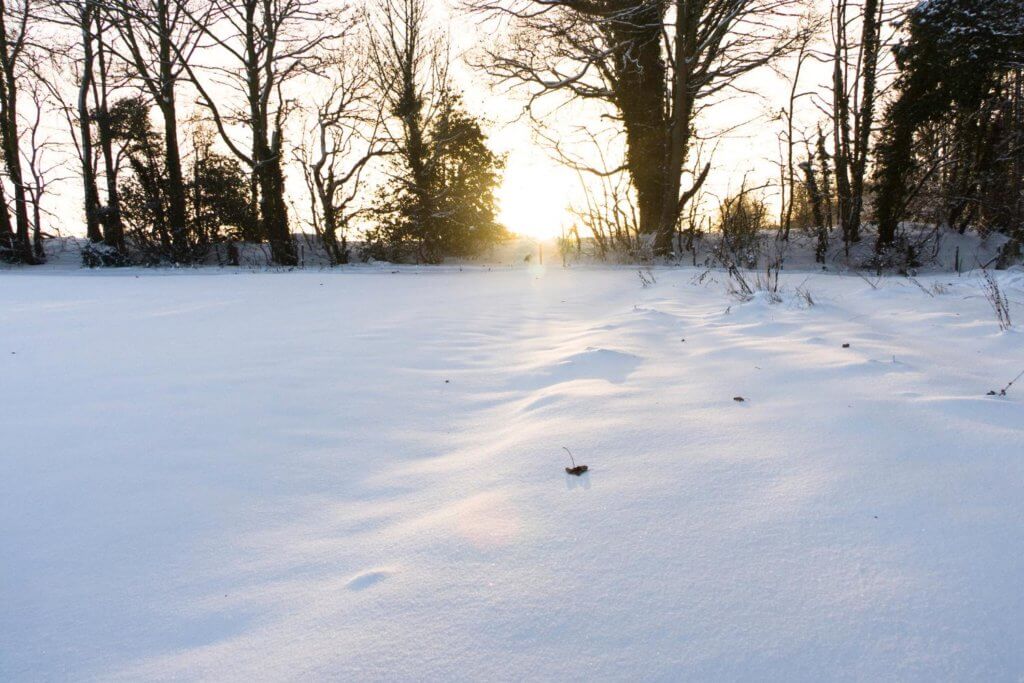
As the winter season brings shorter days and longer nights, it’s important to prepare for less daylight during your winter van life.
The reduced sunlight can impact your daily activities and travel plans, especially if you rely on natural light for navigation or outdoor recreation.
To overcome this challenge, consider equipping your camper van with appropriate lighting options. LED lights are energy efficient and provide bright illumination. Additionally, headlamps or lanterns can be handy when you need to venture outside in the dark, ensuring your safety and visibility.
With less light also comes with less charge for your solar panels- which leaves you with less power for items like your stove, tv, or heater. Park in sunnier areas or bring along propane options for fueling your camper van accessories.
Vanlife Winter Tip #6: Special Gear for Driving
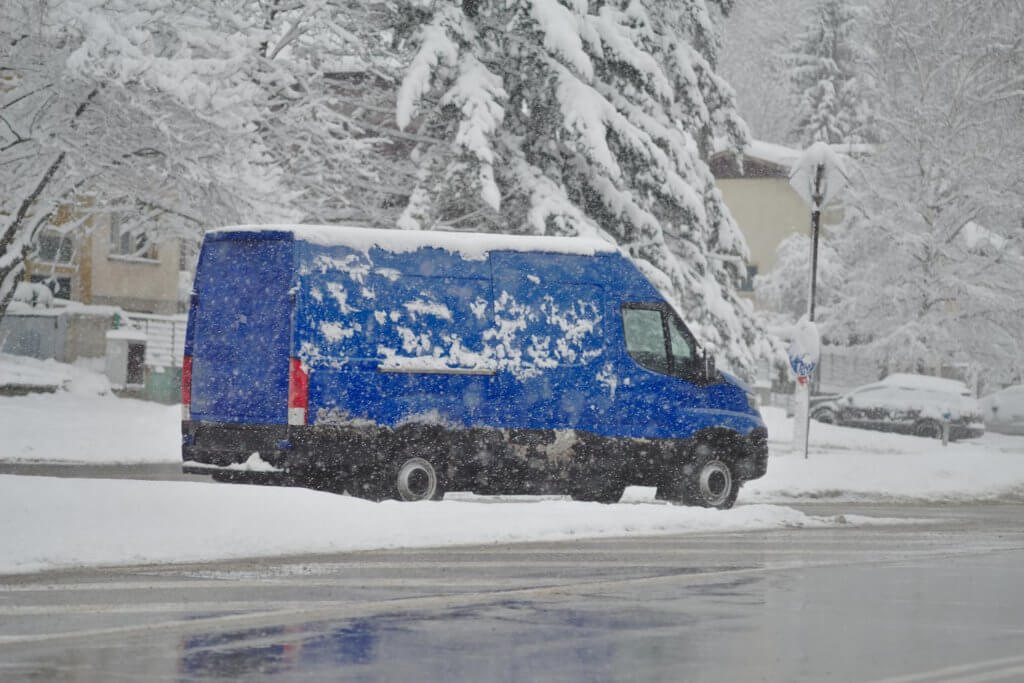
Before hitting the road, it’s essential to consider special gear such as winter tires for driving in cold weather conditions.
Winter tires may be necessary in some areas, such as the Colorado Mountains, but may not be necessary in others, such as the Tennessee Mountains.
You never know what weather you will run into, so if you opt out of installing winter tires, please bring along tire chains for just-in-case scenarios.
Vanlife Winter Tip #7: Winterize the Plumbing
Cold temperatures can wreak havoc on your van’s pipes, potentially leading to leaks, bursts, or even total system failure.
If you plan to travel in your van this winter, you will want to prevent these issues and ensure a seamless travel experience.
One of the first steps in winterizing your plumbing for travel is to insulate any exposed pipes or water lines. This can be done using foam pipe insulation or wrapping the pipes with heat tape. By adding this extra layer of insulation, you’ll help to prevent freezing and maintain water flow throughout your journey.
If you store your camper van throughout the winter
Another important aspect of winterizing your plumbing is to drain all the water from your system to prevent any leftover water from freezing and causing damage.
Start by draining the freshwater tanks and water heater, as well as the grey and black water tanks. It’s also a good idea to blow compressed air through the lines to ensure all water is removed.
Once your plumbing system is drained, it’s time to add antifreeze to prevent any remaining water from freezing. Use RV-specific antifreeze and follow the instructions on the bottle to properly winterize your system. Be sure to run the antifreeze through all faucets, showerheads, and toilets to ensure the entire system is protected.
Vanlife Winter Tip #8: Travel in Warmer Climates
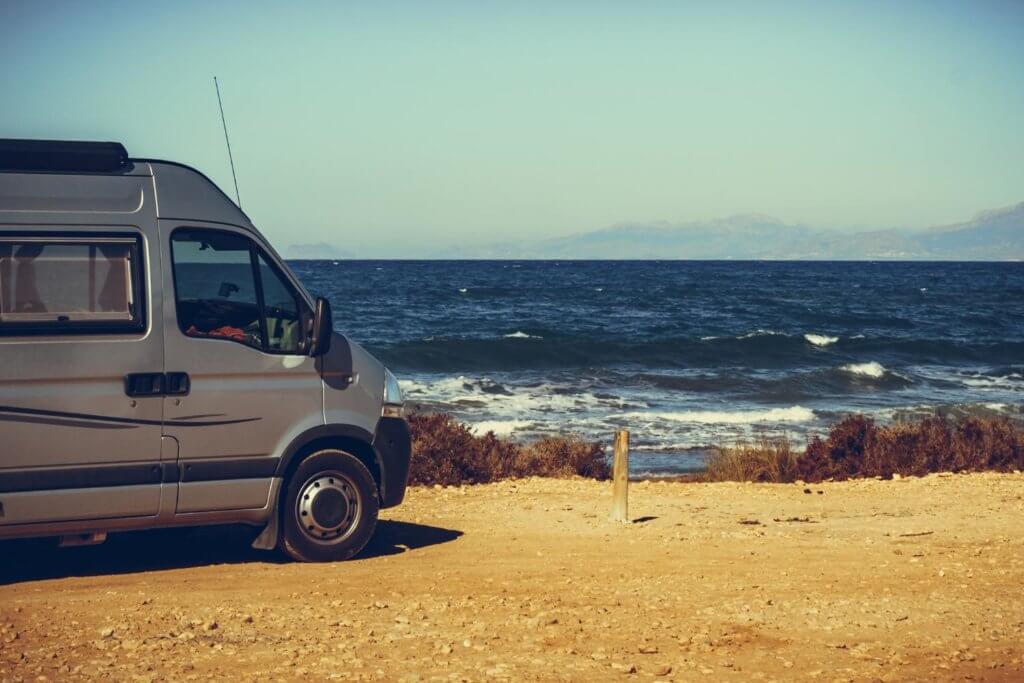
One of the easiest tips I can give you for winter camper van travel is, to explore warmer climates in your camper van. This not only extends your travel possibilities but also allows you to experience the diverse landscapes and cultures that these regions have to offer.
Try traveling to areas like Florida for a break from the cold weather.
Vanlife Winter Tip #9: Use Warm Bedding
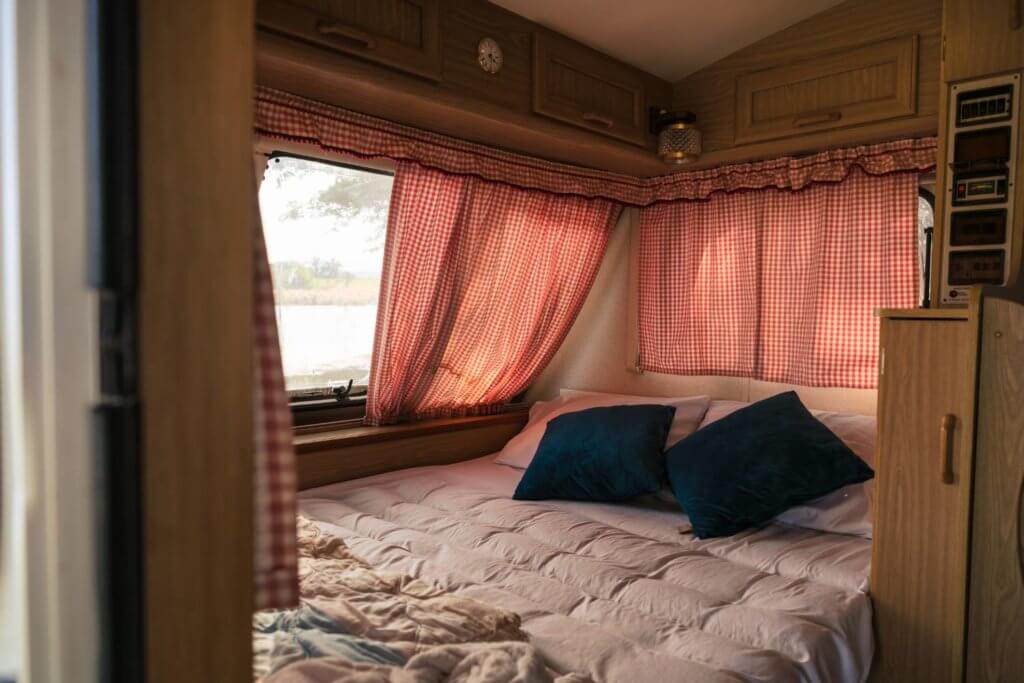
Use warm bedding to create a cozy and comfortable space inside your camper van during the colder seasons. As temperatures drop, it’s crucial to have the right blankets, sheets, and pillows to keep you warm and snug.
Opt for materials like flannel or fleece, which provide excellent insulation and retain heat effectively. Layer your bedding with extra blankets or a down comforter for added warmth on especially chilly nights.
Consider investing in a high-quality mattress or mattress topper specifically designed for cold-weather camping. These products are often made with materials that provide additional insulation and help keep your body heat contained.
Vanlife Winter Tip #10: Keep Your Camper Van Dry
While it’s easy to focus on staying warm during the winter season, it’s equally important to keep your living space dry. Cold and wet conditions can quickly make your travels uncomfortable and even lead to
- Damage to your camper van
- Mold problems
- Musky clothes or boots
- Heating problems.
If your clothes or shoes are wet from the day, make sure you remove them before entering your camper van. Leaving wet clothing or shoes inside your living quarters is asking for trouble.
Try installing a clothesline or buying shoe dryers. You can also place wet clothes in a dry bag for a temporary amount of time.
Vanlife Winter Tip #11: Propane is Better than Solar

Now that we’ve covered the importance of keeping your camper van dry, let’s delve into another key consideration for winter travel: why propane is better than solar. While solar power has its advantages, especially during the warmer months, propane provides a more reliable and efficient energy source for cold-season adventures.
Moreover, propane provides a longer-lasting energy solution compared to solar power. Winter days are shorter, which means there are fewer daylight hours for solar panels to capture and convert sunlight into electricity. With limited sunlight available, relying solely on solar power for heating and other electrical needs can quickly drain your batteries.
In contrast, propane tanks can last for an extended period, as long as you have enough tanks full, allowing you to comfortably enjoy your winter wanderlust without worrying about running out of energy.
While it may be challenging to find a suitable location to set up solar panels in winter conditions, propane stations are more accessible, ensuring that you can easily get a refill wherever you are. This convenience factor can be crucial, especially if you’re exploring remote locations with limited access to electricity.
Vanlife Winter Tip #12: Watch Weather Conditions
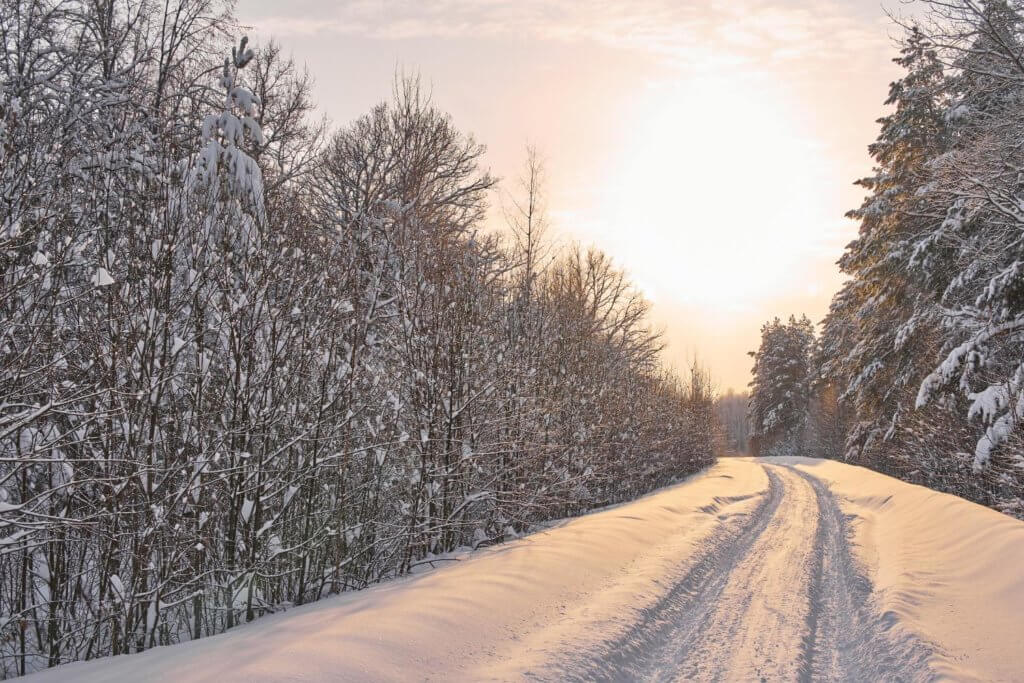
As you plan your winter adventures in your camper van, it’s crucial to keep a close eye on the weather conditions. Winter weather can be unpredictable and potentially hazardous.
One of the first things to consider when watching weather conditions is to keep an eye on the forecast. Check local weather reports regularly, paying attention to any winter storm warnings, blizzard alerts, or severe weather advisories.
Another essential aspect to consider is road conditions. In cold seasons, icy and snowy roads can present significant challenges for travelers. Have I mentioned the importance of always carrying tire chains? Always carry these with you, because you never know when the weather may change.
Furthermore, closely monitoring weather conditions allows you to make necessary preparations within your camper van. Extreme cold temperatures can impact various systems, such as plumbing and propane lines. Checking the weather ahead of time can help you prevent cracks in your lines.
In Conclusion
camper vans are the ultimate travel hack for winter wanderlust. They provide cozy comfort, essential hacks for surviving the cold, and special gear to tackle winter conditions. By insulating properly, covering windows, and wearing warm clothes, you can stay snug and warm in your camper van.

